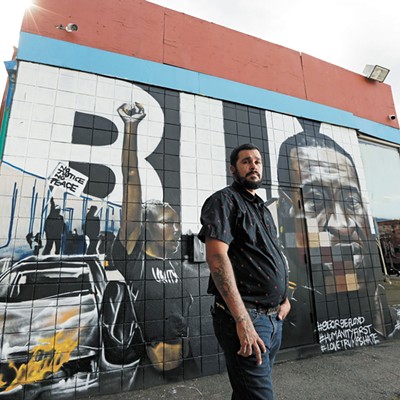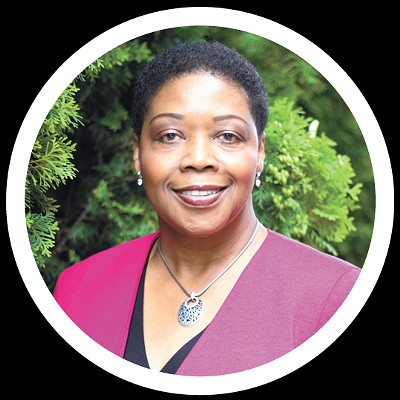As a valedictorian and 2018 graduate of Gonzaga Preparatory School, I can say with confidence that I knew the best of Gonzaga Prep — including an education that has propelled my collegiate success and a community I care about immensely.
I can also attest, as one of Prep's few students of color, that this same education came hand-in-hand with Gonzaga Prep's institutional racism, both insidious and overt.
A classmate once told me I would only get into college because I was Brown. Faculty members asked me where I was "originally" from before even asking my name. I was often confused for other students of color by administrators. Still, nothing impacted me more from my years at Gonzaga Prep than watching a student walk through the front doors in November of 2016 and bellow "WHITE POWER" down the hallway.
What is stamped indelibly in my mind is not simply the triumphant look on my peer's face but, too, the image of my school hallway with every classroom's door standing wide open. What I cannot forget is my 16-year-old self waiting in shock for a faculty member to step through one of those open doors and confront this student. I waited in vain.
Years later, I am still left with a deep sense of isolation and betrayal. To those faculty and staff who unquestionably witnessed this moment, I do not know how to impress upon you just how inadequate your response was — how deafening your silence.
I share this story within the context of a national reckoning with inaction. Language, both tool and weapon, has power. Yet the most important lesson I took away from my education at Gonzaga Prep was the equal and incredibly deleterious power of silence. The day no faculty member stepped into the hallway to address the utterance of a White supremacist slogan was the day I began to recognize a pattern of willful silence at Gonzaga Prep.
Such silence has manifested not only in Prep's inaction in the face of racism but also in their actions, taken under the guise of equity, that succeed only in upholding the status quo. This silence exists in the way Gonzaga Prep has checked-off diversity assessments like items on a grocery list. It surfaces in their hiring of a director of equity and inclusion who has endorsed the use of the N-word by non-Black students in classical literary contexts. Silence enabled Prep to redact, against the opinion of Spokane's NAACP President, a photo of students wearing KKK robes in their 1968 yearbook (as reported by the Spokesman Review).
No matter the good intent behind these silences, the end result for me and my peers of color continues to be the same: We were and are left alone in that hallway, feeling unsafe at our own school. It is the responsibility of those in positions of power to be proactively present, to recognize racism without being told, and to work towards tangible change. Yet time and again, it falls upon your students of color to force you to pay attention and react. Such is the dilemma in academic spaces where students are taught and governed by an almost entirely White faculty, administration, and board of trustees.
Past students have demanded change before. We deserve measurable evidence of improvement; you ask us instead to be patient and tell us that you are trying. I ask in turn: What does your trying look like? Is your trying an active dismantling of racist patterns, or is your trying a passive tinkering with the rules?
To my former teachers, mentors, and administrators, I know this is not the best that you can do. I write because I care deeply for this school and for all students, current and future, who attend Gonzaga Prep. I care enough to hold you to a high standard — one you have, thus far, failed to meet. I write to offer you ways in which to do better.
Step One: ensure that your faculty and staff match the diversity of Spokane's 15 percent non-white population within the next five years. Where proportionally you should have at least 21 faculty of color on your staff, you currently have fewer than five.
Step Two: measure and report the impacts that your efforts towards diversity and equity have had using student and faculty surveys.
Step Three: reevaluate your leadership. You owe it to your students of color to learn where you've made mistakes and work towards amending them. If you cannot learn enough to change what's needed, consider if you are the best person for your role.
I do not write alone: A coalition of 20 Gonzaga Prep students of color, both alumni and currently attending, will be sending your administration a letter suggesting institutional changes that will help the school actionably move towards racial justice and equity. We urge you to share this letter with the public and to listen with open ears. We invite you to walk through the door we have opened. ♦
Ilina Logani is an undergraduate student at Columbia University studying English and economics with the intent to pursue a legal career after college. She is the web editor of the Columbia Literary Review, has delivered a TEDx talk about liminality and race, and is the co-founder of the student group Frontiers of Justice, which aims to help students at Columbia restructure conversations around social justice through a student-developed course, interdisciplinary panels, and conscientious community engagement.





















